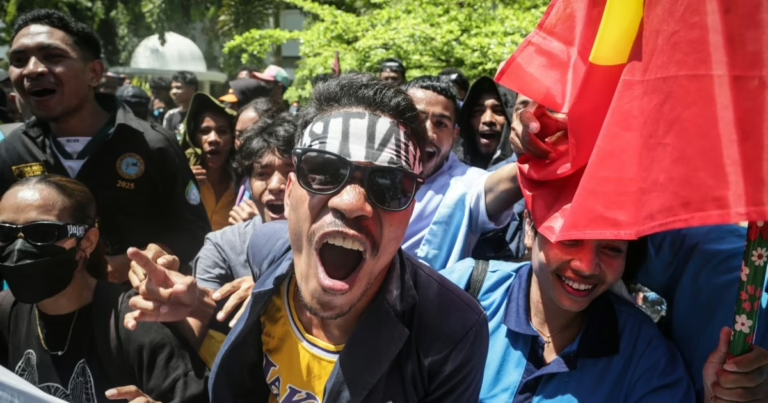Demonstrators were angered by a plan to spend $4.2m on cars for lawmakers in one of Southeast Asia’s poorest countries.
Published On 26 Sep 2025
Lawmakers in East Timor have voted to end a law providing lifetime pensions for parliamentarians, following student-led demonstrations against lavish perks for public officials in one of Southeast Asia’s poorest countries.
Former members of parliament (MPs) and some public officials were entitled under a 2006 law to a lifetime pension equivalent to their salary.
Recommended Stories
list of 3 itemsend of list
But, on Friday, 62 MPs unanimously passed a law scrapping their lifetime pensions, as well as for former presidents, prime ministers and cabinet ministers.
“To all university students, your demands have been fulfilled. Please stop the demonstrations,” Olinda Guterres, an MP from the Khunto party, said after the vote.
The law will now be sent to East Timor’s President Jose Ramos Horta – an independence hero and Nobel Peace Prize winner – to be signed before taking effect.
Protests erupted in East Timor’s capital Dili after a budget item, approved last year, assigned $4.2m to buy Toyota Prado SUVs for each of East Timor’s 65 members of parliament, at a cost of $61,500 per vehicle.
The plan triggered widespread anger in a nation where more than 40 percent of the population lives in poverty, according to World Bank statistics.
Thousands of demonstrators took to the streets on September 15 demanding that parliamentarians vote to cancel the plan.
Protester demands later widened to issues such as ending lifetime pensions for public officials.
Three days of tense protests – which saw demonstrators clash with police, who responded by firing tear gas – ended when MPs agreed to scrap the car purchases and cancel their lifetime pensions if the students ceased their demonstrations.
Parliamentarians came good on their promise on Friday, with Fortunata Alves, a 23-year-old university student, telling the AFP news agency that the result shows that “our fights are not futile.”
East Timor only gained its independence in 2002 after spending more than 270 years as a Portuguese colony and then nearly 25 years under violent occupation by Indonesia, which witnessed its own mass protests last month, prompted by the high cost of living and unhappiness with the government’s economic policy.
The protest that erupted in neighbouring Indonesia quickly turned into full-blown violence following reports that politicians received a $3,000 housing allowance on top of their salaries.
Tens of thousands of people also took to the streets of the Philippines capital, Manila, on Sunday, protesting a corruption scandal linked to flood control projects that cost taxpayers up to 118.5 billion pesos ($2bn) between 2023 and 2025.

















